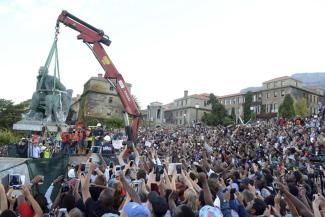Access to universities
#FeesMustFall

The statue of Cecil Rhodes, the British colonialist, has fallen at the University of Cape Town. Using the social-media hashtag “#RhodesMustFall” a protest movement had campaigned for its removal, achieving its goal in April 2015. A few months later, university managements announced more than 10 % tuition fee increases, and soon the strongest post-apartheid student movement took off. Protest have kept flaring up, and they concern fees, curricula and universities’ institutional culture.
Student activists point out that tuition is unaffordable for people from poor backgrounds. One year of studies for a Bachelor’s degree costs the equivalent of € 2000 to € 3000. The fees compound unjust inequality. Only about 12 % of blacks and 14 % of coloureds enrol in higher education, while 51 % of Indians and 58 % of whites do. Blacks make up 80 % of the population. The share of whites is 8.4 %. Primary and secondary schools, moreover, tend to be poor where black and low-income communities live.
Most black families are plainly denied academic opportunities. A recent study showed that only six of 100 children who start school will obtain a university degree, while 60 % of those who qualify for higher education come from the wealthiest third of high schools, all of which charge fees. About half of South Africans earn less than the recently proposed minimum wage of € 240 per month.
Some poor students make it to university nonetheless. They must pay for tuition fees and accommodation, relying on the National Student Financial Aid Scheme (NSFAS), which offers grants to students based on their household income. However, NSFAS funds are short, so the scheme cannot cover all students who qualify for higher learning. Moreover, the “missing middle” falls through the cracks. These are youngsters whose parents’ annual income is slightly above the threshold of about € 8000. They cannot afford the costs of university studies.
Students are now using the hashtag #FeesMustFall. They want tertiary education to be made tuition-free. They argue that education is a public good that should be funded by the state and open to all citizens. Their opponents argue that higher education is a privilege and question the feasibility of making it free for all. Activists, however, insist that it really is an issue of political will.
The student movement is about more than fees, however. It criticises Eurocentric curricula. Inspired by anti-apartheid activists like Steve Biko, they insist that universities must be decolonised. At stake is how knowledge is produced, who has access to knowledge and who decides what kind of knowledge is considered valid and valuable. Decolonisation means to unlearn unjust categories of being human, including racialised identities. South Africa needs better notions that are inclusive and liberating to all.
Students point out that university staff is still predominantly white. They want course content to fit the South African context. Black students’ place in the world must be affirmed. Universities should reflect the country’s diversity and teach in African languages rather than only in English and Afrikaans. Gender issues matter too – female students have been highlighting issues of sexual abuse.
The student movement is worrisome for the ANC government. President Jacob Zuma is struggling with allegations of corruption and his party looks increasingly split. The ANC must face the fact that students’ frustrations result from its failure to improve the opportunities and indeed lives of the vast majority of South Africans.
In September 2016, Blade Nzimande, the minister for higher education, announced another hike of fees. Students’ response was to shut down universities. Private security and the police were massively deployed, and classes eventually resumed. On the upside, the government has established a commission of inquiry to address the demands of #FeesMustFall. This issue will not go away.
Majaletje Mathume is a South African student and activist. majaletjet@gmail.com












